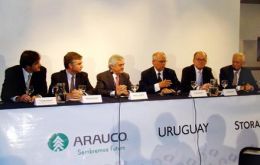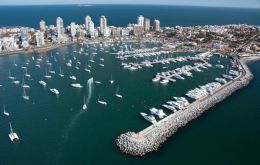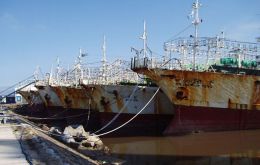MercoPress. South Atlantic News Agency
Uruguay
-
Saturday, May 28th 2011 - 08:02 UTC
Mercosur tourism ministers address ‘border crossings” and overseas promotion

Mercosur tourism ministers agreed to facilitate border crossings for citizens from country members and to draft a homogeneous system for keeping the industry’s statistics, during their XI meeting held in Asuncion, Paraguay.
-
Saturday, May 28th 2011 - 00:36 UTC
Uruguay successfully floats Samurai bonds; warnings of economy over-heating

Interest for Uruguayan ten-year bonds in Yens more than doubled the issue equivalent to 490 million US dollars. The bonds are guaranteed by Japan Bank for International Cooperation with a 1.6% yield.
-
Friday, May 27th 2011 - 22:37 UTC
Chile’s pulp giant Arauco trebles profits in first quarter of 2011

Chile’s Arauco the forestry and pulp unit belonging to the Copec group, trebled profits in the first quarter boosted by higher international prices and sale volumes particularly pulp, according to the company’s latest financial report.
-
Friday, May 27th 2011 - 08:48 UTC
Real estate operations in Punta del Este reached 2.25 billion USD in 12 months

Real estate operations in Uruguay’s hottest resort and leisure farms’ area totalled 2.55 billion US dollars in the twelve months to April 2011, equivalent to daily deals involving 7 million USD.
-
Friday, May 27th 2011 - 08:44 UTC
Roubini forecasts Uruguay needs additional measures to contain inflation

Roubini General Economics, RGE, founded by Nouriel Roubini the economist described as Dr. Doom for having predicted long before his peers the US financial and mortgage crisis said the Uruguayan government must apply additional measures to higher rates and bank reserves, to help contain inflation.
-
Thursday, May 26th 2011 - 19:53 UTC
Construction of Uruguay’s second pulp mill begins with concern on costs in Pesos

The scarcity of qualified labour and the increase in costs have become a growing concern for the pulp mill that Chilean and Scandinavian investors are building in Conchillas, Uruguay.
-
Thursday, May 26th 2011 - 18:31 UTC
Uruguay’s beef and lamb exports up in value but down in volume

Uruguay’s beef exports in the first four months of 2011 have been lower in volume but higher in revenue compared to the same period a year ago. Something similar is happening with lamb although the fall in volume was even greater.
-
Thursday, May 26th 2011 - 18:27 UTC
Record rice crop in Uruguay: 1.65 million tons but farmers concern with prices

Uruguay harvested a record crop of rice this year totalling 1.65 million tons and marked the second highest area planted with the cereal, 195.000 hectares compared to the 200.000 of eleven years ago.
-
Thursday, May 26th 2011 - 16:10 UTC
Ban Ki Moon to visit Uruguay that will hold UN Human Rights Council presidency

Uruguay will be holding next month the presidency of the UN Human Rights Council during 2011/2012 and for this motive UN Secretary General Ban Ki-moon is scheduled to visit Uruguay June 16th when he will be meeting President Jose Mujica and other top officials.
-
Thursday, May 26th 2011 - 11:01 UTC
Korean jiggers mooring off-season in Uruguayan fluvial port

Three Korean jiggers which normally spend off-season time in Montevideo have moored in the port of Fray Bentos on the River Uruguay, as part of the de-centralization process launched by Uruguayan port authorities.
